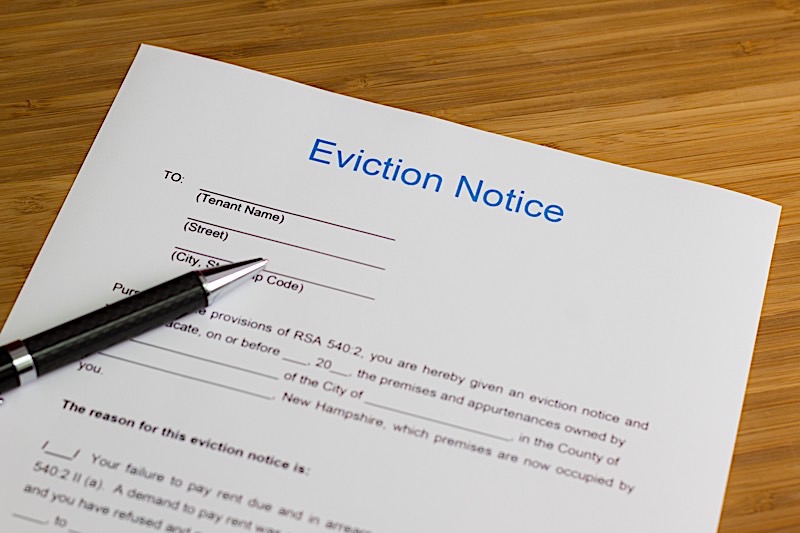Everything You Need To Know About The Eviction Process
 Key Takeaways
Key Takeaways
- The eviction process is usually best left avoided, but there are times when it’s necessary.
- It is important to know how to evict a tenant, even if you never have to follow through with the process.
- Sometimes it’s better to work with tenants than to issue them eviction notices.
The eviction process is often touted as the most significant ultimatum in today’s real estate landscape — you either pay for your transgressions or you will be forced to vacate the premises. No other course of action carries more weight than the threat of eviction notices. It is worth noting, however, that the eviction process is anything but simple. Evicting tenants can very quickly turn into a long and arduous endeavor. Therefore, if you are going to follow through with an eviction, you had better know what you are getting yourself into.
How Does The Eviction Process Work?
The eviction process is nothing, if not more complicated than most people make it out to be. Perhaps even more specifically, there are a lot of moving parts when it comes to evicting tenants — more than most landlords realize. Let it be known, however: understanding how to evict a tenant isn’t a small undertaking, but rather a sizable task. What’s more, the ramifications that coincide with evicting tenants are as abundant as they are weighted. I suggest you know what you are getting into before you start the process.
I do not want to sugar coat it: Evicting tenants is not a fun process, nor should anyone hope things get to that point. However, there are times when it’s necessary to break out the eviction notices. If you are absolutely certain that the eviction process is your only answer, please make sure you know how it works.
Whether you are wondering how to evict a tenant you currently have or you simply need an idea of how the process works, hopefully this primer has the answers you are looking for.
[ Thinking of buying a rental property? Get a FREE downloadable copy of our “Essential Contract Pack For Cashflow Real Estate Investors” ]

Notice For Termination With Cause
A notice for termination with cause is exactly what you’d assume; it’s a valid reason to follow through with the eviction process. In other words, a notice for termination with cause is another way of saying that you have a good reason to initiate the eviction process. And while each state’s eviction processes are different, there are a few universal and valid reasons for filing for an eviction, not the least of which include:
- Pay Rent Or Quit Notices: As the name suggests, pay rent or quit notices are used when a tenant neglects to pay their rent on time.
- Cure Or Quit Notices: Cure or quit notices are a bit more involved, but nonetheless effective. A cure or quit notice is enacted when a tenant violates the lease they once agreed to.
- Unconditional Quit Notices: The most resounding of them all, an unconditional quit notice is enacted when they repeatedly violate lease agreements, neglect to pay their rent, cause damage to the property or engage in illegal activity on the premises.
All of these represent reasons, landlords may act on the eviction process, but each state is different. Be sure to check with the laws in your area before you pursue an eviction to make sure you are doing so for the right reason.
Notice For Termination Without Cause
There have been some documented cases of landlords evicting tenants without just cause, but they are few and far between. Again, check with the laws in your state before you even consider evicting a tenant without proper reasoning. According to Nolo, landlords “may usually use a 30-Day or 60-Day Notice to Vacate to end a month-to-month tenancy when the tenant has not done anything wrong. Many rent control cities, however, do not allow this; they require the landlord to prove a legally recognized reason for eviction (“just cause”) of tenants.”
Removal Of Tenant
In the event you win the suit against your tenant, you have the legal right to evict them. It is worth noting, however, that you can’t simply kick them out of the property the minute the judgement is passed. The eviction process by state will vary, but most municipalities will extend an ultimatum to the tenant once a judgment has been handed down. Either way, the tenant is often given anywhere from a few days to a week to finally leave the property. If they refuse, it is within your legal right to seek the help of the Sheriff’s office to force the tenant to leave. Again, check with your local laws before you actually remove the tenant from the grounds.
How To Evict A Tenant
The eviction process is anything but simple, and can sometimes get downright complicated. There are a lot of moving parts when it comes to giving eviction notices, but the following sums up just about everything you’ll need to know. And while the steps will certainly vary by state, here’s a good example of what you can expect when evicting tenants:
- Know The Law Inside & Out: Eviction is a complicated process, and it’s only made more complicated by underestimating it. Perhaps even more importantly, the laws of eviction will vary from state to state, so be sure to not only familiarize yourself with the legal process, but also the proper laws in your area. It is worth noting that these laws I am referring to should have been identified in your lease agreement, as to let each party know the lease is, in fact, enforceable by state law. Including a section on eviction will go a long way in facilitating the process should it become necessary. In addition to including the proper eviction clauses in the lease, be sure to study up on the process; in the event you will actually need to evict a tenant, you will be glad you did. Above all else, do not — I repeat, do not — attempt to move forward with an eviction if you aren’t fully aware of how the law in your state will allow you to proceed. There are far too many ramifications that carry devastating consequences if you proceed evict a tenant improperly. Taking matters into your own hands without the slightest understanding of eviction laws in your area is the surest way to sabotage your investing career.
- Have A Lawful & Valid Reason: I can assure you, beyond the shadow of a doubt, that you will not want to initiate the eviction process without a lawful and valid reason for doing so. Not only that, but you’ll need documented proof of the accusations you bring against said tenant. Remember, U.S. courts take an “innocent until proven guilty” stance, and the only way you’ll win your eviction case is if you can prove your tenant deserves to be evicted. Some valid reasons include neglecting to pay rent, violating lease agreements, inflicting significant damage to the property and a number of other things. Of course, don’t simply assume you can evict your tenant for anything, make sure your state will allow you to evict them for the right reasons.
- Try Reasoning With Them Before Carrying Out The Eviction: As I already alluded to, the eviction process is long, complicated and convoluted. What I haven’t told you yet is that it can also be a costly process. Evicting a tenant can oftentimes cost a lot more than it’s worth. Therefore, you should try reasoning with them before you actually give them a formal notice of eviction. If the process drags on, as evictions tend to do, you could find yourself paying a lot of legal fees, all the while not receiving any rent. As a result, it may be in your best interest to reason with the tenant at this time. In fact, it may even be worth paying them to move; it could end up saving you a lot of time and money in the long run.
- Give Formal Notice: If the tenant won’t listen to reason, your next course of action is to send them a formal notice of eviction. In the event the tenant has chosen not to cooperate and you have a viable reason to evict them, you will need to follow the legal procedures in your state. More often than not, that means providing them with an adequate “notice of eviction.” In other words, you will need to send them an official document stating your intent to evict them if they do not comply. The amount of time you have to give them till they need to be out of the house will vary by state, so check with your state laws and abide by them. Make sure you give them the amount of time your state requires. It is worth noting that the notice is sometimes enough to get them out.
- File The Eviction With Your Local Courthouse: If the notice didn’t get the tenant out, proceed to file the eviction with your local courthouse. You will have to pay a fee, and perhaps even provide proof that you gave the tenant enough time to vacate the property, but that’s just part of the process. Now, you wait for a court date.
- Attend The Court Hearing: Now is the time you will want all of that proof I mentioned earlier. Gather all the related information to your case, and proceed to backup your claim. At the very least, you’ll need lease agreements, bounced checks, records of any kind, correspondents between you and the tenant, a copy of the eviction notice, and proof they received it. If you have done your job and can prove everything you claim, you could find yourself with an open and shut case, but I digress. It’s not always that simple, so make sure you are prepared for anything.
- Follow Through With The Eviction: In the event you win your case, the tenant will be ordered to move out. The length of time they are given will vary depending on the state. If they refuse to leave, you may enlist the services of the local Sheriff’s department to escort them out of the home.

Eviction Process Summary
I can honestly say it’s better to know the eviction process and not have to use it, than to use it without knowing how to carry it out. If for nothing else, evicting tenants can get messy in a hurry, and end up costing you more money than you anticipated. On the other hand, sometimes eviction notices are the only options left on the table. That said, if you are going to evict someone, make sure you know how to and what’s at stake.
Source : https://www.fortunebuilders.com/eviction-process/
